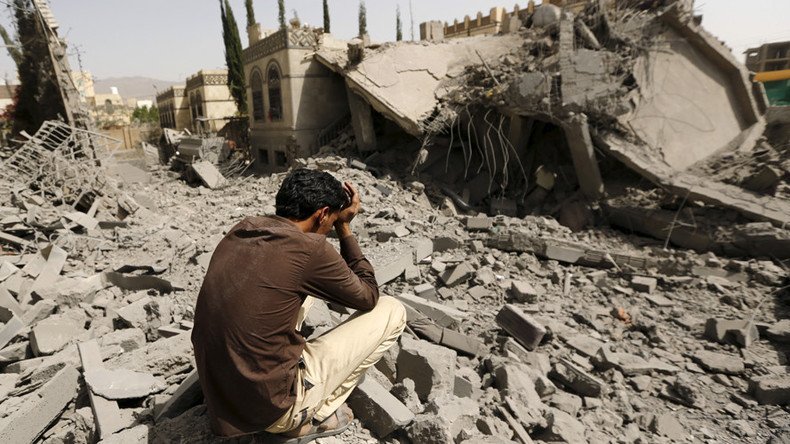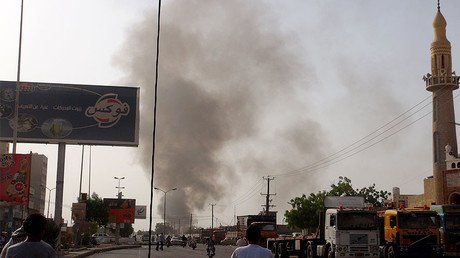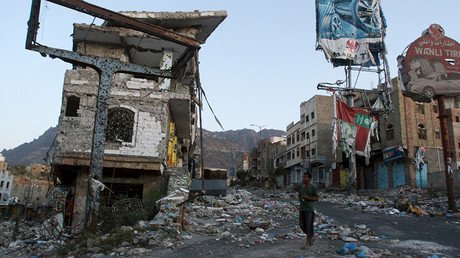Yemen: From Saudi violations of international law to Western complicity in genocide

Genocide is taking place in Yemen at the hands of a coalition of Arab states led by Saudi Arabia, supported by the US and the UK, while the world is deaf to the screams and misery of Yemeni children.
As a university instructor in media studies, I always focus my students’ attention on journalistic objectivity as a significant principle of journalistic professionalism. I teach them about fairness, disinterestedness, factuality, and non-partisanship, and how to encompass all of these qualities in a journalistic piece even if it were an Op-ed.
However, today I find myself compelled to take sides when I write about Yemen. For how can a journalist or a political writer be objective when writing about dead children? Children who have been bombed intentionally in homes, schools, and markets while the world is not only blind but also choosing to ignore the fact that the war on Yemen is a genocidal one.
By now we are used to the indifference of the world when it comes to the atrocities committed by imperial powers in the name of democracy in the Middle East. However, as a mother first and a political writer second, I cannot remain silent on Yemen. Silence is complicity in Yemen. I cannot but take the side of the Yemeni civilians who are victims of an ongoing campaign of haphazard murder which has been going on for two years now, while the United States and the United Kingdom bear a large part of the responsibility.
Being devastated on a daily basis for the past two years with aerial bombing by a Saudi-led coalition, along with a Saudi-imposed blockade doesn’t even begin to cover the situation in Yemen. The latest war crimes committed by joint Saudi airstrikes targeted a market on Friday, March 10 near the town of Khoukha, South of Hodeidah city in western Yemen. The raid killed at least 22 civilians and injured dozens of people who happened to be there shopping for food.
Violations of International Law in Yemen
According to a report by the United Nations Office of the High Commissioner for Human Rights (OHCHR), extremely worrying reports suggest civilians and civilian facilities have been targeted, in violation of international humanitarian law and international human rights law during January 2017, in the southwestern port of Al-Mokha in the Taiz Governorate in Yemen.
Prohibition of the use of force is one of the fundamental principles on which international law has been founded. According to Article 2(4) of the Charter of the UN, all members shall refrain in their international relations from the threat or use of force against the territorial integrity or political independence of any state.
According to The Declaration on Principles of International Law concerning Friendly Relations and Co-operation among States adopted by the General Assembly on 24 October 1970 (resolution 2625 (XXV), “A war of aggression constitutes a crime against the peace, for which there is responsibility under international law.”
According to the declaration, “States have the duty to refrain from propaganda for wars of aggression … [and] every State has the duty to refrain from the threat or use of force to violate the existing international boundaries of another State.”
Although the declaration is not legally binding, it is an important document for the interpretation of the relevant rules of the UN Charter. Therefore, the use of force for furthering national policy as well as interference in the internal affairs of other countries, create the infringement of the basic principles of international law.
As such, the Saudi regime is doing everything in its power to ensure the Yemeni people have no means of survival or sustenance under a crippling blockade that has been in place since the inception of the war of aggression against Yemen. A blockade that is “lamented, decried and condemned” by an international community that hides behind familiar rhetoric while ensuring the flow of arms continues unhindered into Saudi weapons depots.
A country where children are going untreated in hospitals unless parents supply their own medicine due to the systematic blockade and attacks on Yemeni hospitals that meant the hospitals have run out of medicine.
According to a new and critical report from a panel of independent UN Security Council-mandated experts, Yemen is plunging toward an “impending humanitarian catastrophe.” This is being accelerated by the obstruction of humanitarian assistance due to the Saudi blockade which has “significantly reduced the provision of material and services that are indispensable to the survival of civilians.”
Restricted access of commercial flights to the international airport in Sana’a compound these effects. The Saudi-led coalition imposed the restrictions in August, which, the Panel explains, left more than 6,500 people unable to access medical care. These restrictions are still in place.
According to UN estimates, more than 10,000 people have been killed, and 43,000 injured, in the conflict. However, these numbers seem to be only estimated as a rights NGO in Yemen said the military campaign has cost the lives of more than 12,000 civilians.
In a report released on Thursday, February 23, 2017, Yemen’s Legal Center for Rights and Development, an independent monitoring group, put the civilian death toll in the country at 12,041. The fatalities, it said, comprise 2,568 children and 1,870 women.
The rights body said the bombing has also wounded 20,001 civilians, including 2,354 children and 1,960 women, while more than four million others have been displaced.
West complicit in Yemeni carnage
Armed with American and British ammunition and European warplanes, among other Western-supported military hardware, the Kingdom of Saudi Arabia has wreaked havoc in Yemen since March 2015. The offensive, which is allegedly aimed at reinstalling the former Yemeni government, a close Riyadh ally, has been nothing short of blatant violations of all laws of war and human rights condoned and supported by the West.
This US-backed war is not just a case of the former Obama administration sitting vainly by while its close ally goes on a destructive spree of historic proportions. The government has been and still is actively selling the Saudis billions of dollars of weaponry. They are also re-supplying planes engaged in the bombing runs and providing “intelligence” about the targets Saudi Arabia is hitting.
According to a report published by the Global Research, the use of cluster munitions has been recorded 56 times in Yemen by various on-the-ground sources. Cluster bombs supplied, primarily, by the US.
The US is a non-signatory of the Cluster Munitions Convention that bans their use, stockpiling and transfer.
On March 9, Amnesty International accused the Saudi-led Arab coalition of using banned cluster munitions in raids on residential areas. The coalition “absurdly justifies its use of cluster munitions by claiming it is in line with international law, despite concrete evidence of the human cost to civilians caught up in the conflict,” said Lynn Maalouf, research director at Amnesty’s Beirut regional office.
The Saudi-led coalition had also come under repeated criticism over civilian casualties in Yemen, acknowledged in December 2016 because it had made use of British-made cluster bombs. Ahmed Asiri, a spokesman for the Saudi-led coalition fighting in Yemen, admitted back then that: “It has become apparent that there was limited use by the coalition of the UK-manufactured BL755 cluster munitions in Yemen.”
In a recent Human Rights Watch (HRW) report, it was suggested that airstrikes in Yemen carried out by the Saudi-led coalition, were using bombs and missiles bought from the US. Textron, the US-based manufacturer of the CBU-105, said it would stop production of the weapon in August 2016, but there are not reports yet to state the same for 2017.
The US is also complicit in direct warfare against the people of Yemen. Dozens of civilians lost their lives in late January 2017 when US Special Forces carried out an attack against a purported position of Al-Qaeda militants in the central Yemeni province of Bayda.
US Central Command chief General Joseph Votel took full responsibility on Thursday, March 8, 2017, for the Yemen raid that resulted in the death of a Navy SEAL and dozens of Yemeni civilians.
However, a very legitimate question remains unanswered: Would US Central Command chief General Joseph Votel have taken full responsibility for the Yemen raid if a US Navy SEAL was not killed? I’d have to say that this raid was an embarrassment to the US military machine only because it lost one of its own as well as some heavy equipment.
To add to the devastation, earlier this week the State Department approved resuming arms sales to Saudi Arabia previously blocked by Barack Obama over human rights concerns.
Now we wait to see if Congress will review the deal and take action to prevent this bad deal from going through. There are many horrific decisions the United States is taking in Yemen one of which is allowing the Saudi blockade to continue. Adding more weapons to the fight is the ultimate bad decision. Supplying weapons will only embolden Saudi Arabia’s desire for unconditional “victory” against a dying nation regardless of the cost of human lives.
The statements, views and opinions expressed in this column are solely those of the author and do not necessarily represent those of RT.















